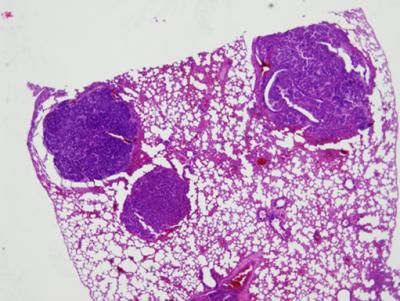Chronic Illness from Faulty Friends
Immune cells can trigger severe pneumonia
Advertisement
A new study has found that malfunctioning immune cells can be the cause of severe pneumonia. This discovery was made by scientists working at the German Research Centre for biotechnology (GBF) in Braunschweig. In the latest issue of the American Journal of Respiratory and Critical Care medicine (AJRCCM), GBF researchers describe how mice in their experiments developed a tendency toward chronic inflammation of the lung's mucous membrane. What they found was that immune cells of the type known as CD 4+T cells bring on such a disease when they inadvertently attack the body's own tissue instead of the invading pathogen.
Diseases and disruptions to pulmonary alveoli and the lung, lymph and vascular tissues of the respiratory system are termed "Interstitial Lung Disease" (ILD) by the medical profession. Various forms of pneumonia are also classified under the ILD heading and can afflict mice as well as humans. The GBF research group led by Professor Jan Buer working together with colleagues from Yale University in the USA used these mice to prove something scientists had long suspected but until now had been unable to prove: that malfunctioning CD 4+T cells play an active role in the emergence of many forms of ILD.
A better understanding of immune reactions in the lung
"For our research we crossed two breeds of mice," explains Dr. Dunja Bruder, a GBF researcher. "The first mouse type carried a special protein molecule in the cells of the lung mucous membrane, a so-called antigen," says Bruder. "The second strain produced aggressive immune cells against exactly this antigen. The result is mice whose immune systems attack their own lung tissue." These animals then developed ILD symptoms.
Shortly after the faulty immune reaction the coexistence of antigens and the opposing CD 4+ T cells triggered immune tolerance mechanisms: anti-inflammatory messenger substances were released and defensive responses were inhibited. "After a severe and acute outbreak of the illness, the symptoms dissipate suddenly and the illness turns into a chronic disease," notes Bruder.
Through the study of how the chronic stages develop scientists hope to field a more comprehensive understanding of immune reactions in the lung. "Malfunctioning immune cells," emphasises Buer, "play a role not only in ILD but also in many other lung diseases such as allergenic asthma. "Very similar genes are turned on in the cells of sick mice as in sick humans, he says, "so if we understand these processes better we could develop new methods of treatment."























































